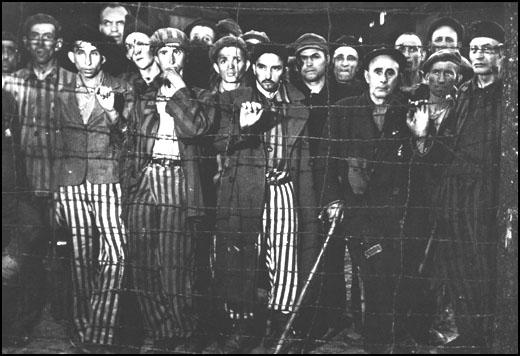Buchenwald
Buchenwald was a concentration camp built just outside of Weimar. The camp supplied prisoners to local manufacturing plants producing armaments. Staffed by members of the SS Death's Head units, it is believed an average of 200 inmates died every day.
As well as the one built at Buchenwald, concentration camps were also built at Dachau and Belsen (Germany), Mautausen (Austria), Theresienstadt (Czechoslovakia) and Auschwitz (Poland).

Primary Sources
(1) Armin Hertz, What We Knew: Terror, Mass Murder and Everyday Life in Nazi Germany (2005)
We went to the town of Breslau. There they put us on open cars and we got a lift to another camp, a very big camp. It was way overcrowded, terrible. They put us in a barrack with nothing for us to sleep on. We had to sit down on the floor and we couldn't even lie down. After a day or two they were looking for workers and we right away volunteered. They wanted about two hundred people to work in a factory nearby. We thought there couldn't be a place worse than this one was, so get out of it. When we arrived at the factory, it had been closed already for weeks. Soon we found out what they wanted us to do. The next morning they took us out to a clearance in the woods. They gave us shovels and they had us dig there. It was February 17, 1945. We left on February 26. Then they took us to a town named Reichenau. There they put us again on open cars, about one hundred people in one car, with no food and a bucket in the middle for sanitary needs. We rode on that train for about six days and five nights. People were dying like flies. We had no water, no food, nothing. Once in a while it snowed, so we had a little water from the snow.
The train stopped many times en route. Sometimes it stopped near a station on a siding and they left the train standing there for a whole day because they needed that locomotive to push another train, a through train or a supply train for the army. While we were there and when we saw a civilian nearby, we used to scream and yell, but they wouldn't give us anything. Finally, the train arrived in Buchenwald, Germany, near Weimar. In our car, there were 107 people. Anytime somebody died, we took their clothing off, put it around us to keep warm, and put the dead bodies over to one side. When we arrived in Buchenwald, they opened up the train and the few people that were still alive could hardly walk. I, myself - my toes were frozen - have no toes left; all of them fell off.
In Buchenwald, the administration of the camp was political prisoners, not all necessarily communists, but democrats, socialists, lawyers, and intellectuals who were against the Nazi regime. These were nice people. They really wanted to help us, not like in Auschwitz. They had very little that they could give us, but whatever they had they shared. They tried to do the best they could. I myself couldn't walk. They had taken off my shoes; they had to cut them off actually because my feet were frozen and my toes almost fell off by themselves...
We had bunks where four to five people slept in a line with a little straw for a bed; there were four levels. The commandant decided that the sick people didn't need the full ration anymore because they didn't work. They didn't give us any bread anymore. They only gave us that soup, so-called soup. We were very, very sick. If that would have lasted another day or two, I would not have made it.
